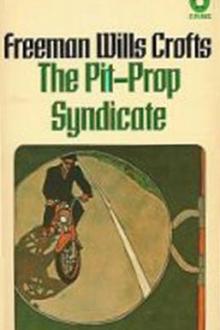The Pit Prop Syndicate by Freeman Wills Crofts (best book club books for discussion TXT) 📕

- Author: Freeman Wills Crofts
- Performer: -
Book online «The Pit Prop Syndicate by Freeman Wills Crofts (best book club books for discussion TXT) 📕». Author Freeman Wills Crofts
The friends expressed their satisfaction at this arrangement, and it was decided that as soon as the investigation was over all three should meet and compare results at Leatham's house.
Next evening saw the two inquirers back at their hotel in Hull. They had instructed the owner of their hired boat to keep it in readiness for them, and about eleven o'clock, armed with the footstool and the satchel of food, they once more got on board and pulled out on to the great stream. Merriman not wishing to spend longer in the barrel than was absolutely necessary, they went ashore near Hassle and had a couple of hours' sleep, and it was well past four when they reached the depot. The adventure was somewhat more risky than on the previous occasion, owning to the presence of a tiny arc of moon. But they carried out their plans without mishap, Merriman taking his place in the cask, and Hilliard returning to Hull with the boat.
If possible, the slow passage of the heavily weighted hours until the following evening was even more irksome to the watcher than on the first occasion. Merriman felt he would die of weariness and boredom long before anything happened, and it was only the thought that he was doing it for Madeleine Coburn that kept him from utter collapse.
At intervals during the morning, Benson, the manager, or one of the other men came out for a moment or two on the wharf, but no regular work went on there. During the interminable hours of the afternoon no one appeared at all, the whole place remaining silent and deserted, and it was not until nearly six that the sound of footsteps fell on Merriman's weary ears. He heard a gruff voice saying: “Ah'm no so sairtain o' it mesel',” which seemed to accord with the name of Leatham's skipper, and then came Benson's voice raised in agreement.
The two men passed out of the shed and moved to the edge of the wharf, pursuing a desultory discussion, the drift of which Merriman could not catch. The greater part of an hour passed, when first Benson and then Menzies began to stare eastwards down the river. It seemed evident to Merriman that the Girondin was in sight, and he began to hope that something more INTERESTING would happen. But the time dragged wearily for another half-hour, until he heard the bell of the engine-room telegraph and the wash of the screw. A moment later the ship appeared, drew alongside, and was berthed, all precisely as had happened before.
As soon as the gangway was lowered, Benson sprang aboard, and running up the ladder to the bridge, eagerly addressed Captain Beamish. Merriman could not hear what was said, but he could see the captain shaking his head and making little gestures of disapproval. He watched him go to the engine room tube and speak down it. It was evidently a call to Bulla, for almost immediately the engineer appeared and ascended to the bridge, where all three joined in a brief discussion. Finally Benson came to the side of the ship and shouted something to Menzies, who at once went on board and joined the group on the bridge. Merriman saw Benson introduce him to the others, and then apparently explain something to him. Menzies nodded as if satisfied and the conversation became general.
Merriman was considerably thrilled by this new development. He imagined that Benson while, for the benefit of Menzies, ostensibly endeavoring to make the arrangements agreed on, had in reality preceded the pilot on board in order to warn the captain of the proposal, and arrange with him some excuse for keeping the ship where she was for the night. Bulla had been sent for to acquaint him with the situation, and it was not until all three were agreed as to their story that Menzies was invited to join the conclave. To Merriman it certainly looked as if the men were going to fall into the trap which he and his friends had prepared, and he congratulated himself on having adhered to his program and hidden himself in the barrel, instead of leaving the watching to be done by Menzies, as he had been so sorely tempted to do. For it was clear to him that if any secret work was to be done Menzies would be got out of the way until it was over. Merriman was now keenly on the alert, and he watched every movement on the ship or wharf with the sharpness of a lynx. Bulla presently went below, leaving the other three chatting on the bridge, then a move was made and, the engineer reappearing, all four entered the cabin. Apparently they were having a meal, for in about an hour's time they emerged, and bringing canvas chairs to the boat deck, sat down and began to smoke—all except Bulla, who once again disappeared below. In a few moments he emerged with one of the crew, and began to superintend the coupling of the oil hose. The friends had realized the ship would have to put in for oil, but they had expected that an hour's halt would have sufficed to fill up. But from the delay in starting and the leisurely way the operation was being conducted, it looked as if she was not proceeding that night.
In about an hour the oiling was completed, and Bulla followed his friends to the captain's cabin, where the latter had retired when dusk began to fall. An hour later they came out, said “Good-night,” and separated, Benson coming ashore, Bulla and Menzies entering cabins on the main deck, and Captain Beamish snapping off the deck light and re-entering his own room.
“Now or never,” thought Merriman, as silence and darkness settled down over the wharf.
But apparently it was to be never. Once again the hours crept slowly by and not a sign of activity became apparent. Nothing moved on either ship or wharf, until about two in the morning he saw dimly in the faint moonlight the figure of Hilliard to relieve him.
The exchange was rapidly effected, and Hilliard took up his watch, while his friend pulled back into Hull, and following his own precedent, went to the hotel and to bed.
The following day Merriman took an early train to Goole, returning immediately. This brought him past the depot, and he saw that the Girondin had left.
That night he again rowed to the wharf and relieved Hilliard. They had agreed that in spite of the extreme irksomeness of a second night in the cask it was essential to continue their watch, lest the Girondin should make another call on her way to sea and then discharge the faked props.
The remainder of the night and the next day passed like a hideous dream. There being nothing to watch for in the first part of his vigil, Merriman tried to sleep, but without much success. The hours dragged by with an incredible deliberation, and during the next day there was but slight movement on the wharf to occupy his attention. And then just before dark he had the further annoyance of learning that his long-drawn-out misery had been unnecessary. He saw out in the river the Girondin passing rapidly seawards.
Their plan then had failed. He was too weary to think consecutively about it, but that much at least was clear. When Hilliard arrived some five hours later, he had fallen into a state of partial coma, and his friend had considerable trouble in rousing him to make the effort necessary to leave his hiding place with the requisite care and silence.
The next evening the two friends left Hull by a late train, and reaching Leatham's house after dusk had fallen, were soon seated in his smoking-room with whiskies and sodas at their elbows and Corona Coronas in their mouths. All three were somewhat gloomy, and their disappointment and chagrin were very real. Leatham was the first to put their thoughts into words.
“Well,” he said, drawing at his cigar, “I suppose we needn't say one thing and think another. I take it our precious plan has failed?”
“That's about the size of it,” Hilliard admitted grimly.
“Your man saw nothing?” Merriman inquired.
“He saw you,” the mineowner returned. “He's a very dependable chap, and I thought it would be wise to give him a hint that we suspected something serious, so he kept a good watch. It seems when the ship came alongside at Ferriby, Benson told the captain not to make fast as he had to go further up the river. But the captain said he thought they had better fill up with oil first, and he sent to consult the engineer, and it was agreed that when they were in they might as well fill up as it would save a call on the outward journey. Besides, no one concerned was on for going up in the dark—there are sandbanks, you know, and the navigation's bad. They gave Menzies a starboard deck cabin—that was on the wharf side—and he sat watching the wharf through his porthole for the entire night. There wasn't a thing unloaded, and there wasn't a movement on the wharf until you two changed your watch. He saw that, and it fairly thrilled him. After that not another thing happened until the cook brought him some coffee and they got away.”
“Pretty thorough,” Hilliard commented. “It's at least a blessing to be sure beyond a doubt nothing was unloaded.”
“We're certain enough of that,” Leatham went on, “and we're certain of something else too. I arranged to drop down on the wharf when the discharging was about finished, and I had a chat with the captain; superior chap, that. I told him I was interested in his ship, for it was the largest I have ever seen up at my wharf, and that I had been thinking of getting one something the same built. I asked him if he would let me see over her, and he was most civil and took me over the entire boat. There was no part of her we didn't examine, and I'm prepared to swear there were no props left on board. So we may take it that whatever else they're up to, they're not carrying brandy in faked pit-props. Nor, so far as I can see, in anything else either.”
The three men smoked in silence for some time and then Hilliard spoke.
“I suppose, Leatham, you can't think of any other theory, or suggest anything else that we should do.”
“I can't suggest what you should do,” returned Leatham, rising to his feet and beginning to pace the room. “But I know what I should do in your place. I'd go down to Scotland Yard, tell them what I know, and then wash my hands of the whole affair.”
Hilliard sighed.
“I'm afraid we shall have no option,” he said slowly, “but I needn't say we should much rather learn something more definite first.”
“I dare say, but you haven't been able to. Either these fellows are a deal too clever for you, or else you are on the wrong track altogether. And that's what I think. I don't believe there's any smuggling going on there at all. It's some other game they're on to. I don't know what it is, but I don't believe it's anything so crude





Comments (0)